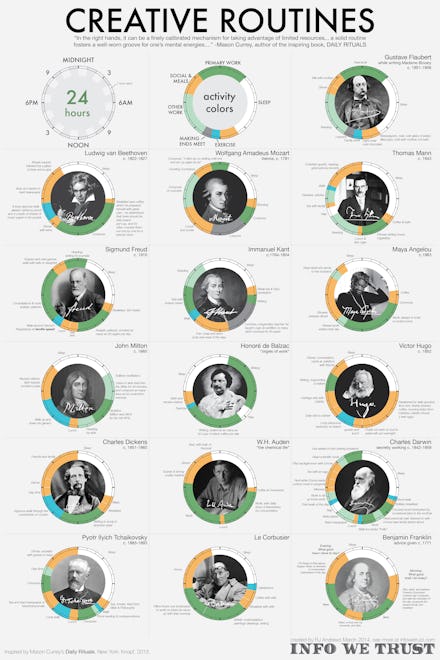The World's Most Successful People Share 7 Simple Things in Common

Image Credit: Getty
It's hard work to be amazing at everything. For some people, though, it seems to come naturally. Here's the truth: a) It doesn't, and b) You can do exactly what they do.
Here are seven proven ways to increase your efficiency through very manageable steps.
1. Work the hours that are best for you: No, this doesn't mean jumping out of bed at the crack of dawn.
Scientists who've studied behavior and productivity have found that people are consistently better at solving tough analytic problems when they face them at the times of day when their energy levels are most stable, regardless of when they awoke. A 2011 study, for example, concluded that while 'morning people' are better problem-solvers in the early hours of the day, 'night people' are far better at solving problems in the evening because their energy levels are more stable at that time.
2. Make lists: Successful people love to-do lists. And who doesn't feel a little zing of satisfaction after crossing off one of the items on a long checklist?
If you work in an office (or in any setting with other people around), much of your day can be dictated by the needs of others. Keeping a list can help keep you on track regardless of the distractions that come up throughout the course of the day.
It also helps to have multiple lists: You can keep one for tasks that need to be accomplished immediately or by the day's end, and another for longer-term projects and bigger goals.
Image Credit: Getty
3. Take breaks: Our brains naturally move between focusing intently on a set task and jumping around between all sorts of vague ideas. And contrary to what our high school teachers would have had us think, we rely that back-and-forth to function. So the next time you need to focus on something, say, an important meeting you have scheduled in the afternoon, set out a chunk of the day beforehand when you can let your mind wander.
Taking breaks to daydream helps us sort out complex ideas. That's why you often arrive at an 'aha!' moment in the shower or a few minutes before sleep. It's important to capitalize on these periods when they come instead of pushing them away. So the next time you feel your mind wandering, ask yourself if you have a few minutes for a daydream. It might help you more than you thought.
Image Credit: Info We Trust
4. Go for a walk: Besides giving your mind a chance to daydream, a brief break — when enhanced with a little physical activity — can boost creative thought. A short stroll not only increases blood flow to the brain (key when it comes to forming new ideas) but can also combat age-related declines in brain function and improve memory and cognitive performance. In a 2009 study, researchers found that adolescents who walked on a treadmill for 20 minutes did better on standard reading tests than their peers who didn't. And adults who walk at least a few times a week have thicker wiring in the parts of the brain associated with performing complex tasks, suggesting better overall functioning.
Image Credit: Neuroscience
5. Get a good night's sleep: Gone are the days when two hours of shut-eye and half a case of Red Bull were all you needed to get through a midterm, three classes and a fraternity party. And as it turns out, just a week of sleeping fewer than six hours each night can result in serious health problems, from the modification of over 700 genes to weight gain and quadrupled stroke risk. Dreaming, too, helps us commit what we've learned during the day to memory. As a result, we do better on tests after a deep rest.
Image Credit: Huffington Post
6. Learn to say no: Considering taking on another project even though you have a handful of other tasks on your plate? Instead of saying yes producing sub-par work, stay focused on what matters most. "Learning to say no when it is in your personal best interest, or in the interest of your company, is an extremely valuable skill," writes Inc Magazine. Prioritizing what's most important and putting your best work forward will pay off in the end.
7. Fake it 'till you make it: Acting confident not only makes you appear more self-assured, but convinces others that you've got the skills it takes to do the job at hand. A recent study in the journal PLOS One found that the friends of students who assumed they would get higher grades in a course also thought their peers would get higher grades, regardless of how well they actually did in the class.
Being awesome might look tough, but it's actually as easy as following a few simple rules.